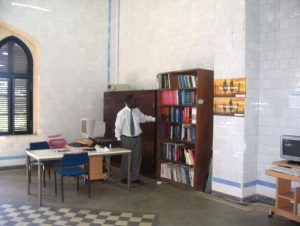IAHPC Faculty Development Award:
A Report by a recipient
PALLIATIVE CARE IN TANZANIA – THE BEGINING OF THE BEGINNING
by Dr. Msemo Diwani
Palliative care is in its infancy in Tanzania . A situation analysis and needs assessment study on palliative care which was funded by WHO in 2002 revealed that the patient’s main needs were relief of pain and accessible and affordable drugs.
The commonest problem experienced by both the patients and caregivers were economic/financial constraints. In Tanzania , less than 10% of those who need palliative care have access to it.
Ocean Road Cancer Institute (ORCI) has traditionally practiced palliative care since its inception and is the only institute in the country that has oral morphine. Palliative care now exists in ORCI as an independent section with Dr. Msemo Diwani as its head. Dr. Msemo’s post, which is both service and teaching, is funded by the International Association of Hospice and Palliative Care (IAHPC) through a two year faculty development award, after which, the faculty will be responsible for the sustenance of the program.
After his appointment in December 2004 as a Palliative care Consultant and head of the section, the first thing he did was to conduct a brief situation analysis. This revealed a lack of a dedicated full time staff which hampers significantly both service delivery and expansion of palliative care. He restructured the team and defined clear goals and objectives. He made a 2-year plan of action, which will guide him, as well as, become his performance indicators. Significant groundwork has been done on this project. A proposal has been submitted to formally introduce palliative care in the medical and nursing curriculums for undergraduate students. While waiting for this process to be completed, palliative care teaching is carried out under Oncology. Plans are also underway to start a short course in palliative care which will be multidisciplinary and aimed at training health care professionals with the view of establishing palliative care teams in all regional and referral hospitals throughout the country and later to reach all the districts. At the same time, ORCI palliative care services have been expanded to include home based care (HBC), volunteer training and palliative care research.
Ocean Road Cancer Institute, due to its strategic position in the medical school, intends to build the capacity of stakeholders in Palliative care in order to ensure that the many Tanzanians who need palliative care get access to it.
We have no exact figure of the number of patients receiving palliative care annually as we are still analyzing the situation.
With regards to drug availability for palliative care patients, step one drug and some adjuvants are available in all health facilities, and over the counter. Step two and step three drugs are available in most districts, regional and referral hospitals. Oral morphine is only available at ORCI, hence not widely used. Most health professionals do not know how to approach pain effectively. The use of step three drugs will be addressed in the IAHPC faculty development project. The knowledge gap existing among health professionals, as far as pain management is concerned, has contributed significantly to the suffering of our patients, particularly those with chronic pain due to HIV/AIDS and the cancers. Through this IAHPC initiative we believe that pain control eventually will be a reality amongst our HIV/AIDS and cancer sufferers.
Apparently Dar es Salaam city, with over 3.5million inhabitants, utilizes health facilities from its three district hospitals. It has given a green light to organize palliative care training among it’s staff. This was confirmed during my meeting with the City Medical Officer. The home based care program is due to start and will also target this population.
Plans are also underway to nationalize palliative care. Meetings with relevant officials in the ministry in this regard will take place soon. The ministry of health acknowledges that Tanzania is among the most hard hit by the HIV/AIDS pandemic in sub-Saharan Africa and with its poor resources, palliative care will be a most effective and realistic way of addressing the suffering of these people.
To read about previous IAHPC Faculty Development awards go to URL:
http://www.hospicecare.com/faculty/
 
 

|




